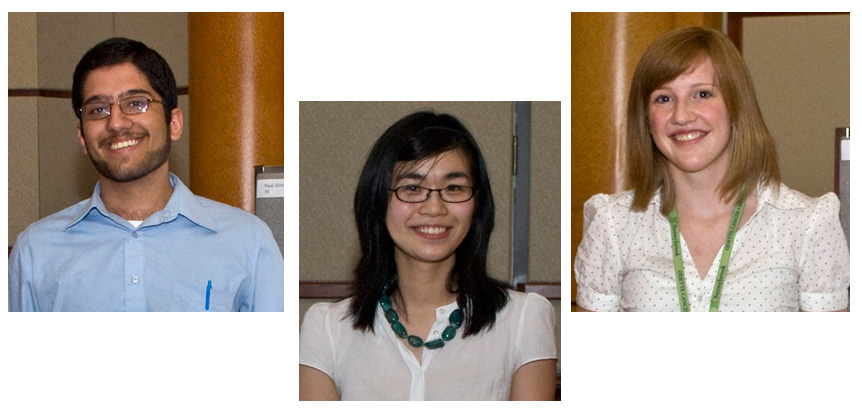Three Undergraduates Share Their Insights On Making the Most of the Summer Research Studentship
By Alisa Kim
“Inspiring.” “A privilege.” These are just some of the responses from undergraduates who participated in the summer student research program at Sunnybrook Research Institute (SRI). Running May through August, the program provides students with hands-on research training and the opportunity to work with SRI scientists, and culminates in the summer research project competition. While students have developed a deep admiration for their supervisors, SRI researchers have in turn been very impressed with the students’ work. “The calibre is superb—far better than the type of science being done 10 years ago,” says Dr. Don Redelmeier, director of the discipline of clinical epidemiology and a judge of the competition. “It’s so heartening that the next generation seems to be better than the generation that preceded it.”
Miaad Aliroteh, Jessica Truong and Diana Withrow were winners in the imaging, clinical integrative biology and clinical epidemiology disciplines, respectively, at this year’s competition. Here, they reflect on the experience—rewards, challenges and lessons learned.
What was it like working with your supervisor(s)?
Aliroteh: My supervisors [Drs. Michael Bronskill and Rajiv Chopra] structured my project really well. They also gave me the opportunity to participate in weekly meetings and present my work to the team. Although some of the work I did followed a set procedure, I was free to explore and think for myself. I gained a lot of practical experience and a sense of contributing to the group.
Truong: I had a really great experience working with Dr. [Isabelle] Aubert. [I was given] a lot of independence and allowed to plan and carry out a lot of my own experiments. She was also really enthusiastic and friendly, which made working with her all the more enjoyable.
Withrow: I was very fortunate to have worked with these doctors [Rebecca Dent, Teresa Petrella and Sunil Verma]. They provided me with insight into the day-to-day tasks of a clinician and researcher, encouragement when I was unsure of myself, and guidance whenever I reached a fork in the road. The passion they have for their work is contagious and I look forward to having a career that I am equally excited about.
What did you learn about the nature of research?
Aliroteh: I learned that research is mostly about validating key concepts or designs while development/commercialization is about perfecting these concepts and designs. My project was simplified so that it could be completed within the four-month time frame, and yet prove or disprove the big question.
Truong: At the Aubert lab, research is a team effort. We tried our best to assist each other on our projects, and I know that I couldn't have done my project without the other members of the lab. Because everything was new to me, I had to ask for help from many people—about where things were kept, how I should approach things, which protocol to use, etc.
Withrow: I had expected many aspects of research to be tedious, and from time to time they were. But I also learned how very rewarding it is to complete a project and see all your work synthesized in a meaningful way.
What were some challenges you encountered, and how did you deal with them?
Aliroteh: A significant portion of my work was engineering design, which is about finding a solution that fixes several problems at once. Often a solution to one problem makes another problem worse. I had to explore the best solutions on my own, make a few guesses, try a few things and see what worked well. In the end, these challenges are what made this experience worthwhile and rewarding.
Truong: Understanding the nature of the lab and what it takes to plan out a project took a long time to get used to … [I was] continually modifying my experiments after more readings and collaborations with other members of the lab. My experiments did not always work out as planned, but there was always someone in the lab who had a similar experience to help me fix the problem.
Any advice for other summer students?
Truong: Enjoy [your] time, especially with the other members of the lab. Knowledge in the field of research you want to work in helps; you don't have to spend as much time learning a whole new field, and you can spend more time planning your experiments instead. Time goes by very quickly. Your summer is over before you know it!
Withrow: Four months is relatively short, and there is a steep learning curve when you are in a brand-new environment. I think it is important to ask questions, be observant of the people around you and bring enthusiasm to the tasks at hand.






